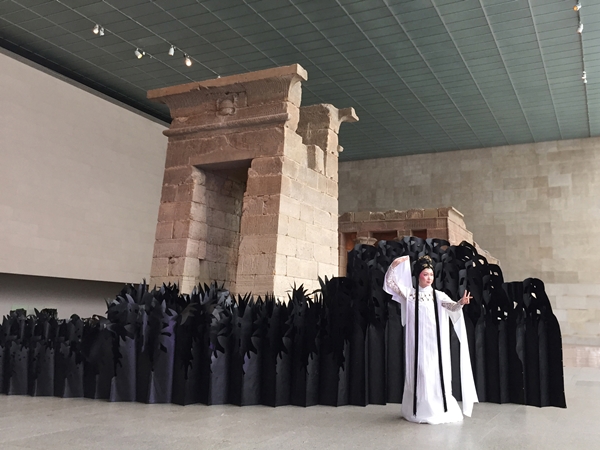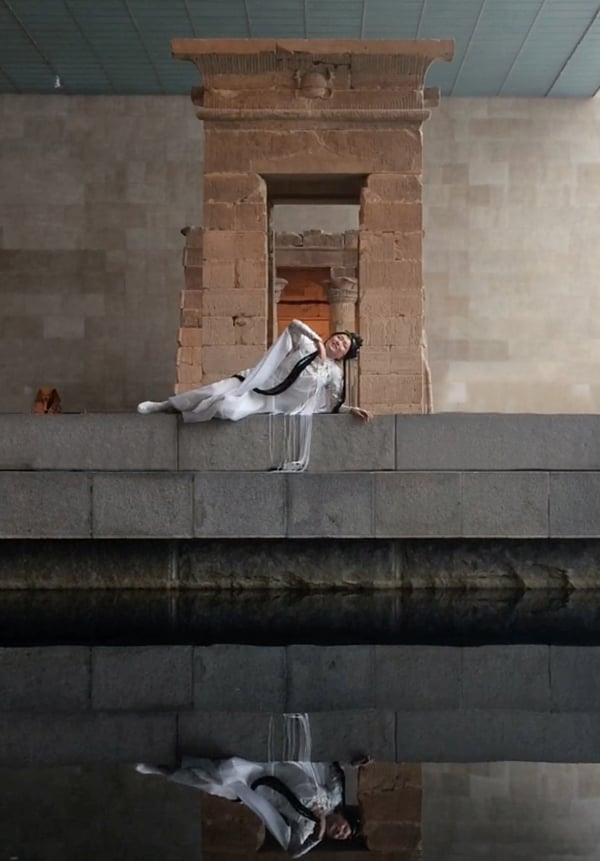Art & Exhibitions
Jennifer Wen Ma’s Dystopian Opera To Debut at Spoleto Festival
The artist is best known for her work on the 2008 Beijing Olympics.

Photo: courtesy of Stephanie Berger.
The artist is best known for her work on the 2008 Beijing Olympics.

Christie Chu

In May, Paradise Interrupted—an opera conceived, directed, and designed by Chinese artist Jennifer Wen Ma and composed by Huang Ruo, which is still in development, will have its world premiere in its completed form at Spoleto, one of the world’s leading performing arts festival, in Charleston, South Carolina.
Perhaps best known for her work participating on the design team for the 2008 Beijing Olympics, her permanent public color and light installation on the Beijing National Aquatics Center, as well as her beautiful ink gardens, Ma took a leap of faith by embarking on this ambitious project, which we caught a glimpse of when it was previewed at the Metropolitan Museum.
Inspired by Eve’s character from the Biblical story the Garden of Eden and Du Liniang’s character from The Peony Pavilion (a traditional Kunqu opera), the four-scene opera, a preview of which was first presented at Rotterdam’s Witte de With Contemporary Art Center in 2013 and later that year at the Performa biennial in New York, features a female protagonist played by Qian Yi who gets rejected from the Garden of Eden and attempts to come to terms with her new condition. One of the most striking aspects of the staging is the sculptural garden of trees and shrubs, composed of inky black paper, which gradually expands accordion-like throughout the performance seemingly mirroring her psychological state. The complete staging will also include video projections.
We recently spoke to Jennifer Wen Ma about this project.
How did Paradise Interrupted begin?
This performance is about a person that has known ideal perfection but no longer has it. The opera is about what she is going through on a psychological level, after she is ejected from the Garden of Eden.
I developed this opera in several stages. The first phase was on research into the Garden of Eden, during an exhibition at Witte de With Contemporary Art Center that asked artists to reinterpret tradition. Qian Yi, who inspired this opera, was supposed to fly to Rotterdam to perform, but she got pregnant, so we took a sound of her singing a capella. I did a presentation on how tradition Kunqu opera is and then I showed a tape of her singing, to reveal the differences. We had Michelin-starred chefs that created food based on the Garden of Eden, we also had two biblical scholars that specialized in the subject, and a western opera singer (because we have both techniques in the opera). It was more a public talk of development.

Paradise Interrupted at the Temple of Dendur.
Photo: courtesy of Stephanie Berger.
How did you decide on using black for the large paper-cuts? How is color used in the opera?
The use of black stems from ink. It’s so malleable, it’s rich, opaque, it can be washed away very easily. It’s the combination of all colors, but it’s also the absence of light. Ink was also the main mode of communication for Asia for many centuries. And for me, it’s the essence of Chinese culture.
The setting is first black and white, and then slowly at the height of the drama it becomes very colorful to indicate her [Qian Yi’s character] internal landscape is changing.
I took the concept of the cut-out from a scroll, when a scroll is closed it’s unassuming and small, but then once you open it, a whole world comes into play. Then you close it and the world is gone. The whole ephemeral quality is what I’m interested in.
I saw your hanging gardens in Beijing a few years ago. They were stunning. Why does nature often play a role in your art?
In 2009, I was invited to do a project in Japan for the Echigo-Tsumari Triennial. They use the site over and over again for invited artists. But when I got there, I decided not to clear the ground (where weeds often grow). I was doing these stepping pools filled with ink, and I thought ‘what if I painted the plants [with] ink to make it look like they absorbed the water from the step pools?’
I thought the ink would kill the plants, but in fact, I think they made them stronger. By the end of the project (3 months), the plants taught me something. The plants grew out the ink and they were more green than black. This force of nature was stronger than the ink.
What are you working on at the moment besides wrapping up this project?
I’m also developing a parallel piece that’s more installation-based. I think different venues have different needs. So I definitely want to develop one that is shorter, more art performance based. Afterwards the set would remain for two or three months for people to visit. There would be interactive elements—visitors can listen to songs and see images, as well as the entire garden.
“Paradise Interrupted” will debut at Spoleto Festival in South Carolina on May 22nd.